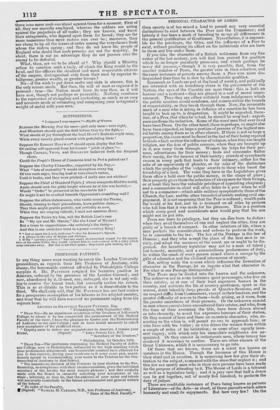SUPPOSITIONS.
" I suppose I may suppose."—Eights of Woman.
SUPPOSE the Morning Post for once—just only once—were right, And Ministers should quit the field before they try the fight,— What shouts of joy throughout the land lIowr's Radicals might raise, While every county glared around with gratulating blaze Suppose Sir ROBERT HALFWAY* should again display that face Of smiling self-approval from his former " pride of place,"— Though CROKER, Twtss, and GOULBURN bellowed forth the frequent
cheer, Could the People's House of Commons lend to Peel a patient ear ?
Suppose the Charley Chancellor, supported by his Sug,— What "lots of mutuality"t would strengthen every tug Of two such sages, braying loud at toleration's tether, Until it broke, and they were pitched—I really care not whither!
Suppose the Chief of Hundred Fights,: whose conquests filledthe world, Again should seek the giddy height whence he of late was hurled,— Would " Order" be preserved in his inevitable fall ?
Or might it not be crushed beneath Oppression's crumbling wall ?
Suppose the silken stateswomen, who rustle round the Throne, Should, turning to their pincushions, leave politics alone,— They then might prattle prettily, not pettishly as now, When they are reaping ridicule, I need not mention Howe.
Suppose the Tories try him, will the British Lion's roar Be "My eye and Mr. Martin," like the Lions' of Mysore? But a truce to suppositions—the certainty's the thing— And this is our unshaken trust in a peace-creating King !
• " Let us meet the Lords half-way."—See Sir ROBERT'S Speech.
t A phrase in the play of Spring and Autumn.
t If the " fawning parasites " had any really disinterested regard for the reputa- tion of the noble Duke, they would counsel him to rest content with a glory which none can take away. But this is not their game; they could gain nothing by it.


























 Previous page
Previous page